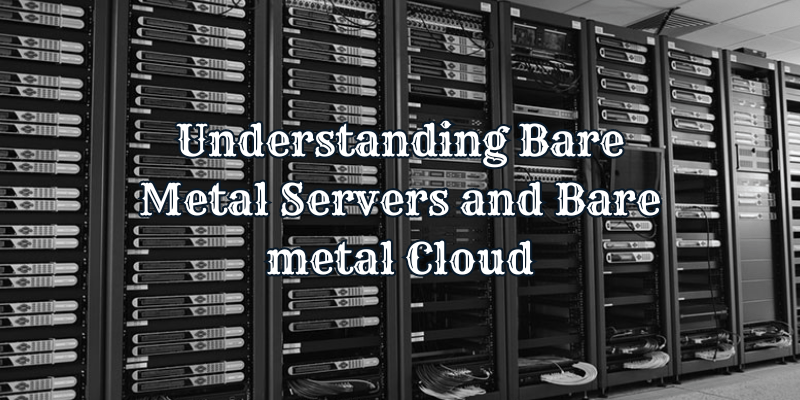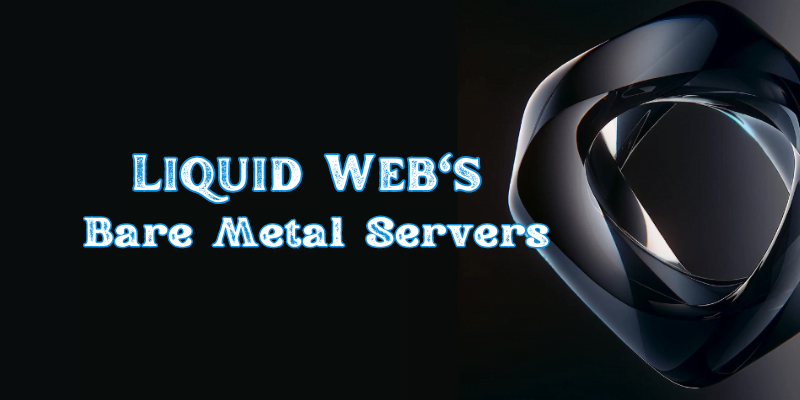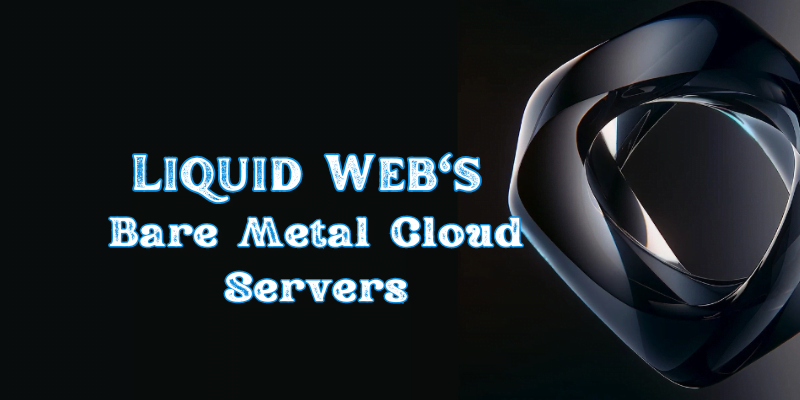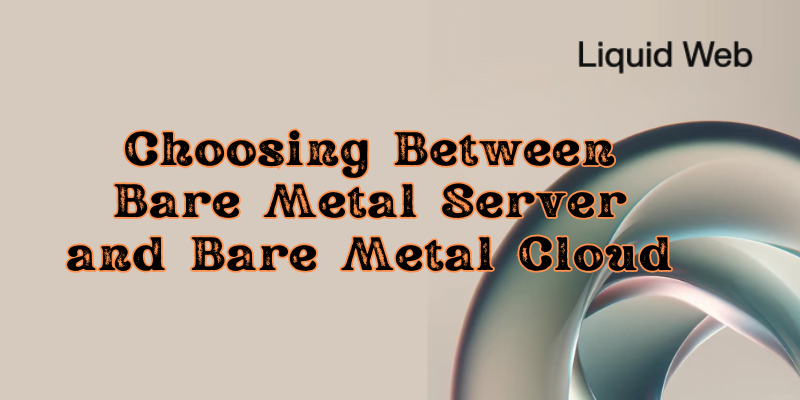In a Grand View Research, Inc. report, the global bare metal cloud market size is anticipated to reach USD 36.50 billion by 2030, expanding at a CAGR of 23.9%. But does that growth mean it’s the right choice for you?
Should you go with the raw power of a bare metal server or the scalability of a cloud solution?
These are some of the questions that IT managers, business owners, developers, and system administrators usually face when deciding between bare metal server vs cloud solutions because both bare metal servers and bare metal cloud solutions have their strengths.
A bare metal server offers dedicated hardware, which means you get 100% of the server’s power without sharing resources with anyone else. This is perfect for businesses that need consistently high performance and control over their environment. On the other hand, bare metal cloud gives you the best of both worlds: the performance of bare metal with the flexibility to scale up or down as your needs change.
Liquid Web offers both solutions, and in this blog post, we’ll break down the differences between the two, so you can decide which is the right fit for your business.
Let’s jump in!
DISCLOSURE: WebIncomeJournal is supported by readers like yourself. We may earn an affiliate commission when you purchase through our links, which enables us to offer our content for free. Learn more here.
Related: The Best WordPress Hosting Services for Beginners in 2024
Understanding Bare Metal Servers and Cloud Servers

Let’s get started by defining bare metal servers and cloud servers and also understanding their advantages and disadvantages.
What is a Bare Metal Server?
A bare metal server is a physical server that is entirely dedicated to a single tenant. Unlike cloud servers that share resources among multiple users, a bare metal server provides exclusive access to all its hardware—ensuring peak performance and total control. These servers are ideal for:
- Businesses running data-intensive applications, such as big data analytics, complex simulations, or machine learning.
- Companies handling sensitive data, such as financial institutions or healthcare providers, to ensure higher security.
- Online gaming or eCommerce sites that experience high traffic and require stable performance without any risk of resource contention.
Key features:
- Dedicated Resources: All CPU, RAM, and storage are allocated to a single user.
- Full Customization: Users have root access, allowing for complete control over the operating system and software.
- Physical Isolation: Since no resources are shared, security is enhanced.
- No Virtualization Layer: Bare metal servers avoid the performance overhead associated with virtualization, providing direct access to the hardware.
Advantages of Bare Metal Servers:
- High Performance: With all resources dedicated, bare metal servers are ideal for resource-intensive applications like AI, machine learning, and big data processing.
- Enhanced Security: Since your data is physically separated from other users, security compliance is easier to maintain, making it a preferred choice for industries like healthcare or finance that require compliance with regulations like HIPAA and PCI-DSS.
- Customization: You can fine-tune every aspect of the server, from the OS to the hardware, ensuring optimal performance for your specific needs.
Disadvantages of Bare Metal Servers:
- Cost: Due to their dedicated nature, bare metal servers tend to be more expensive than virtualized options, especially for businesses with fluctuating demands.
- Scalability: Scaling up or down can be slower compared to cloud solutions, as new hardware might need to be provisioned manually.
- Management: Managing a bare metal server requires more technical expertise, as users are responsible for software updates, security patches, and general maintenance.
What is a Cloud Server?
A cloud server is a virtualized server that operates within a cloud computing environment, sharing resources like CPU, memory, and storage with other virtual servers.
Unlike bare metal servers, cloud servers use virtualization technology, such as hypervisors, to split physical hardware into multiple virtual instances. This setup allows users to scale resources up or down quickly, making cloud servers highly flexible and cost-efficient.
The common use cases for cloud servers are:
- Dynamic Workloads: Cloud servers are ideal for applications with variable traffic, such as eCommerce websites that experience seasonal spikes or SaaS platforms that need flexible resource management.
- Development and Testing Environments: Developers often use cloud servers for sandbox environments, where they can quickly spin up and tear down virtual machines for testing purposes.
- Startups and SMBs: Smaller businesses benefit from the low upfront costs and scalability that cloud servers offer, allowing them to grow without hefty infrastructure investments.
Key features of Cloud Servers include:
- Virtualization: Resources are shared across multiple users through a hypervisor, creating isolated virtual environments.
- On-Demand Scalability: Easily scale resources up or down to meet real-time demands.
- Cost-Efficiency: Pay only for the resources you use, which makes cloud servers ideal for businesses with fluctuating workloads.
- High Availability: Many cloud service providers offer built-in redundancy, ensuring minimal downtime.
Advantages of a Cloud Server:
- Flexible Resource Allocation: Unlike bare metal servers, cloud servers allow businesses to scale resources in real time, making them highly adaptable to changing demands.
- Cost-Effective: The pay-as-you-go model enables businesses to pay for only what they use, which can save costs, especially for startups and small businesses.
- Reduced Management: Cloud servers come with built-in management features like automatic backups, monitoring, and updates, which reduces the burden on in-house IT teams.
- High Availability: Many cloud providers, such as AWS, Google Cloud, and Microsoft Azure, offer redundancy across data centers, ensuring uptime even during hardware failures.
Disadvantages of a Cloud Server:
- Performance Variability: Since resources are shared in a multi-tenant environment, performance can sometimes fluctuate, especially when multiple users compete for the same resources.
- Limited Customization: Although flexible, cloud servers don’t offer the same level of hardware control as bare metal servers, which may limit optimization for certain applications.
- Security Concerns: While most cloud providers offer robust security features, the shared nature of cloud infrastructure can make businesses more vulnerable to data breaches or compliance challenges.
Cloud servers excel in scalability and cost-efficiency, making them a preferred choice for businesses with fluctuating workloads or those just starting out. However, for workloads that require consistent performance or high levels of customization, a cloud server might not offer the necessary control that a bare metal server provides.
Related: Liquid Web Bare Metal Server Hosting Review: Is It Worth the Price?
Liquid Web’s Bare Metal Server Solutions

Liquid Web offers a range of bare metal servers designed for businesses that demand high performance, complete control, and security. These servers are housed in state-of-the-art data centers with enterprise-grade security and high availability.
With fully dedicated hardware, Liquid Web’s bare metal servers deliver optimal efficiency, making them ideal for handling resource-intensive applications like big data analytics, machine learning, and high-traffic websites.
Key options for Liquid Web’s bare metal servers include:
- Intel E-2356G: Featuring 6 cores @ 3.2 GHz (5.0 GHz Max Turbo), 32 GB of RAM, and 2 x 960 GB SSD storage. This option is ideal for small businesses or startups looking for reliable performance without breaking the bank. Starting at $75/month with a 50% discount for the first three months.
- Intel Xeon Gold 6526Y: Equipped with 16 cores @ 2.9 GHz, 64 GB NVMe storage, and 10 TB bandwidth, this server caters to mid-sized businesses requiring higher performance. Coming soon at $137.50/month.
- Intel Xeon Gold 6526Y Dual: For businesses handling high-performance workloads like AI/ML or eCommerce platforms with heavy traffic, this option provides 32 cores and 128 GB RAM, delivering optimal computing power. Pricing starts at $237.50/month with discounts available.
Unique Features and Benefits
- Dedicated Resources: Unlike cloud servers, Liquid Web’s bare metal servers ensure that all resources—CPU, memory, and storage—are exclusively dedicated to your business. This means no “noisy neighbors” or performance issues caused by resource contention.
- Full Customization: With root access, users can fully customize their servers, from the operating system to security settings. Whether you need Linux or Windows, or wish to install specific software configurations, Liquid Web offers the flexibility to tailor the server to your exact needs.
- NVMe SSDs for Speed: Liquid Web’s use of NVMe solid-state drives (SSDs) in their higher-tier options ensures blazing-fast data retrieval, reducing latency for data-heavy applications.
- Enterprise-Grade Security: Each server is housed in a highly secure data center with DDoS protection, physical security measures, and regular backups through Acronis Cyber Backup. This makes Liquid Web a reliable partner for businesses that must comply with strict regulatory requirements, such as HIPAA and PCI-DSS.
- 24/7/365 Support: With Liquid Web’s award-winning support team available around the clock, users can get help with setup, troubleshooting, or scaling their servers, ensuring smooth and uninterrupted operations.
- Scalability: While bare metal servers are traditionally less scalable than cloud solutions, Liquid Web’s offerings allow for easy hardware upgrades, including increased RAM, additional NVMe storage, or bandwidth expansions as needed.
Pricing and Scalability Options
Liquid Web’s bare metal server pricing starts at $75/month for their entry-level servers. Higher-performance configurations, such as the Intel Xeon Gold 6526Y, offer dual-core options for businesses requiring advanced performance, with pricing ranging from $137.50 to $237.50/month.
While bare metal servers generally require a higher upfront cost than virtualized cloud servers, Liquid Web offers competitive pricing for businesses seeking top-tier performance. The added benefit of hardware upgrades allows companies to scale without the need for a complete infrastructure overhaul. This flexibility ensures that as your business grows, so too can your server’s capacity—whether it’s adding RAM, expanding storage, or increasing network speed.
At the time of writing, you can get 50% off for the first 3 months on all packages. Click here to get started.
Liquid Web’s Bare Metal Cloud Offerings

Besides its Bare Metal Server solutions, Liquid Web also offers Bare Metal Cloud Servers. These are designed to combine the power of bare metal servers with the scalability and flexibility of cloud infrastructure.
This hybrid approach offers businesses the best of both worlds: dedicated hardware resources with the agility typically associated with cloud computing. This makes it an ideal solution for businesses that require high performance but need the flexibility to scale quickly based on demand.
Key specifications of Liquid Web’s Bare Metal Cloud Servers include:
- No hypervisor overhead: Direct access to hardware for faster processing.
- High performance NVMe SSDs for quick data retrieval.
- Instant provisioning: Get started within minutes, reducing wait times typical of traditional bare metal setups.
Unique Features and Benefits
- On-Demand Scalability: Unlike traditional bare metal servers, which can take longer to provision, Liquid Web’s bare metal cloud allows businesses to scale up or down rapidly. This is perfect for businesses with fluctuating resource demands, such as eCommerce sites or streaming platforms.
- Pay-as-You-Go Model: Liquid Web’s bare metal cloud uses a pay-as-you-go pricing structure, enabling businesses to pay for only the resources they need. This makes it more cost-effective for companies that don’t require constant, high-level performance.
- Cloud-Native Benefits: With integrated cloud features like backups, snapshots, and virtualization support, businesses can enjoy greater flexibility in managing their infrastructure, while still benefiting from bare metal-level performance.
- Enterprise-Grade Security: Like Liquid Web’s bare metal servers, their bare metal cloud offerings come with built-in DDoS protection, automated backups, and compliance with regulations like HIPAA and PCI-DSS.
Pricing and Flexibility Options
Liquid Web’s bare metal cloud pricing is designed to be flexible. Starting as low as $137.50/month, businesses can access the 16-core Intel Xeon Gold 6526Y with 64 GB NVMe SSD storage. For higher performance needs, the dual 32-core Intel Xeon Gold 6526Y is available starting at $237.50/month.
Flexibility is a key component of Liquid Web’s bare metal cloud servers. Businesses can provision resources within minutes and scale them on-demand without the need for manual server upgrades. This makes it an ideal choice for companies looking to manage variable workloads with maximum efficiency and minimum hassle.
Click here to check the current prices.
Liquid Web’s Bare Metal Server vs Cloud Solutions Compared
| Feature | Liquid Web’s Bare Metal Servers | Liquid Web’s Bare Metal Cloud |
| Resource Allocation | Fully dedicated hardware, no resource sharing | Fully dedicated, but with cloud integration capabilities |
| Performance | High performance with no virtualization overhead | High performance with minor virtualization overhead |
| Scalability | Manual scaling, slower to provision additional resources | Instant scaling, on-demand resource allocation |
| Customization | Full control over OS, software, and configurations | Limited to cloud-native tools, less control over hardware |
| Security | Physical isolation, ideal for compliance needs | High security with cloud-based protection (e.g., DDoS) |
| Management | Requires in-house management or third-party service | Easier to manage with built-in cloud automation features |
| Provisioning Time | Longer provisioning, takes hours to set up | Fast provisioning, up and running in minutes |
| Redundancy | Manual redundancy setup required | Built-in redundancy with snapshots and backups |
| Use Cases | Consistent, high-performance workloads (AI/ML, databases) | Fluctuating workloads (eCommerce, big data, AI bursts) |
| Price | Starting at $75/month (50% discount applied). | Starting at $137.50/month |
This table provides a clear comparison to help you decide which solution, bare metal servers or bare metal cloud, is the better fit for your business needs.
Related: Liquid Web Reviews (+ The Best Alternatives for 2024)
Choosing Between Bare Metal Server and Bare Metal Cloud

When deciding between bare metal servers and bare metal cloud, several factors come into play. Since every business is unique, choosing the right infrastructure depends on key elements like business size, workload demands, budget, and security needs.
Let’s consider these different factors:
1. Business Size and Growth Projections
Your current business size and how you project future growth will greatly influence which solution is best suited for you. If your business is growing but still small, bare metal cloud offers the flexibility to scale up as your demand increases. The pay-as-you-go model means you can start small and only invest in additional resources when needed.
However, for businesses that already have predictable workloads and need consistent high performance, bare metal servers may be the better option. They offer long-term cost-efficiency for enterprises that require steady and constant resources.
2. Workload Requirements and Resource Demands
Another key factor is your workload requirements. Understanding how much computing power, memory, and storage you need is crucial for determining the right infrastructure. For businesses running data-intensive applications like AI, machine learning, or big data often require bare metal servers due to their raw computing power and dedicated resources.
However, for businesses like eCommerce platforms or streaming services with variable traffic, bare metal cloud provides the ability to scale dynamically as demand fluctuates.
3. Budget Constraints and ROI Expectations
Your budget is yet another factor. You should consider both upfront costs and long-term return on investment (ROI). If your budget is tight or unpredictable, bare metal cloud offers lower upfront costs and allows you to scale as needed, making it a cost-effective option in the short term.
On the other hand, for businesses with consistent workloads, bare metal servers provide better long-term ROI. Although they require a higher initial investment, the fixed monthly costs can lead to more savings over time.
4. IT Expertise and Management Preferences
Your IT team’s capabilities and the level of management you want to handle can also influence your decision. If you prefer a low-maintenance solution, bare metal cloud offers built-in features like automated backups, snapshots, and simplified management. This is ideal for businesses with limited IT staff or those that want to focus on their core operations.
However, for businesses with a dedicated IT team that prefers to manage custom configurations and optimize performance, bare metal servers allow for more fine-tuned control over the infrastructure.
5. Compliance and Security Needs
If your business operates in a highly regulated industry, like finance or healthcare, your compliance and security needs are paramount. Both bare metal servers and bare metal cloud offer strong security features, but the right choice depends on your specific regulatory requirements.
For industries that require physical data isolation to meet compliance standards like HIPAA or PCI-DSS, bare metal servers may be more suitable due to their single-tenant environment. However, bare metal cloud provides excellent security measures like DDoS protection and real-time monitoring while maintaining a level of data isolation. This is often sufficient for businesses that need a secure environment but don’t require physical separation of resources.
All in all, bare metal servers are the clear choice when performance, customization, and security are top priorities. These servers are best suited for businesses with long-term investments in their infrastructure, as well as organizations that need full control over their environment and the ability to meet strict compliance standards.
On the other hand, bare metal cloud is the go-to option for businesses that require the flexibility of cloud computing while maintaining the dedicated performance of bare metal servers. Its on-demand scalability makes it ideal for businesses with fluctuating workloads, while the pay-as-you-go pricing model provides the cost-efficiency needed for startups and growing businesses.
Conclusion
There you have it, our in-depth analysis of Liquid Web’s bare metal servers vs cloud servers. As you’ve seen, Liquid Web’s bare metal servers offer complete control, and dedicated resources, and are ideal for businesses with consistent workloads that require high performance and strict security.
On the other hand, the bare metal cloud offering provides the flexibility of the cloud with the power of bare metal, making it perfect for businesses with fluctuating demand and those seeking cost-efficiency through a pay-as-you-go model.
Choosing between the two depends on whether you prioritize ultimate performance and control (Bare Metal Servers) or flexibility and scalability (Bare Metal Cloud).
If you’re unsure which option is best for your needs, you can let the experts at Liquid Web guide you. With tailored solutions designed to meet your business goals, Liquid Web can help you navigate the complexities of infrastructure management.
Click here to visit their website to learn more.
FAQs: Bare Metal Servers vs Cloud
-
Is bare metal cheaper than cloud?
Bare metal servers typically have higher upfront costs compared to cloud solutions, especially for businesses that only need resources intermittently. However, for companies with consistent, high-performance demands, bare metal servers can be more cost-effective in the long run because you’re not paying for resource flexibility that you don’t need. Cloud solutions, such as bare metal cloud, are more affordable in the short term due to the pay-as-you-go model, but costs can add up quickly if you’re scaling up frequently.
-
What is the difference between bare metal and cloud computing?
The main difference is in how resources are allocated and managed. Bare metal servers offer dedicated hardware that is fully assigned to a single user, providing maximum control and performance. Cloud computing, including bare metal cloud, provides more scalability and flexibility, as resources are allocated dynamically, allowing businesses to scale up or down based on real-time demand. Bare metal cloud combines the performance of bare metal with the flexibility of cloud environments.
-
What is the difference between bare metal and virtual servers?
Bare metal servers provide direct access to hardware with no virtualization layer, meaning you get 100% of the server’s resources with no sharing or overhead. Virtual servers, on the other hand, run on top of a hypervisor that divides a physical server into multiple virtual machines, which share resources. This results in lower performance and control for virtual servers compared to bare metal. Bare metal servers are preferred for applications that require high performance and security, while virtual servers are more suited for cost-efficiency and scalability.
-
What is the main difference between bare metal servers and bare metal cloud?
The key difference lies in resource allocation and scalability. A bare metal server provides dedicated hardware resources with no sharing, offering maximum performance and control. Bare metal cloud, on the other hand, combines dedicated performance with the scalability and flexibility of cloud infrastructure, allowing for easier scaling and cloud-native benefits like snapshots and backups.
-
Can I easily switch between bare metal servers and bare metal cloud with Liquid Web?
Yes, Liquid Web offers flexible migration options, enabling users to transition between bare metal servers and bare metal cloud. Their expert support team can help ensure a smooth switch based on your evolving infrastructure needs.
-
What are the performance benefits of bare metal cloud over traditional virtualized cloud services?
Bare metal cloud delivers the high performance of dedicated hardware while avoiding the overhead typically associated with virtualized environments. This results in faster processing times and lower latency compared to traditional virtualized cloud solutions, which rely on shared resources and hypervisors.


